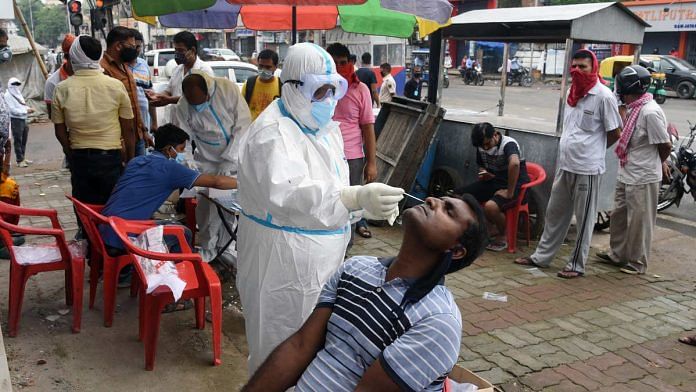
New Delhi: Just 12 per cent of the Covid-19 tests that Bihar has done so far are RT-PCR tests, the Union Health Ministry said Tuesday in its daily briefing.
The state is conducting over one lakh tests every day, and has so far registered over one crore tests.
“Bihar has so far done 1,15,21,841 tests, out of which 12,93,900 are RT-PCR tests, which means Bihar has done 12 per cent RT-PCR tests and the remaining are rapid antigen tests (RAT),” Health Secretary Rajesh Bhushan said in reply to a question from ThePrint, adding that as on Tuesday, 46 per cent of the tests conducted across India were RT-PCR tests.
“You can always argue that a large number (of tests) are RAT, but Bihar has also been advised by us that wherever they conduct RAT, all symptomatic negatives should be mandatorily subjected to RT-PCR. That is our advice to all states. We don’t want undetected persons to spread the infection,” Bhushan added.
Bihar has among the best Covid numbers in the country, with a positivity rate of less than 2 per cent and a case fatality rate of 0.5 per cent, which is about one-third of the national average rate.
Bhushan also said that a central team that visited Bihar during the assembly election campaign had flagged violations like of mask usage, hand hygiene and social distancing norms outside big urban centres. Violations of Covid norms were so rampant that the Election Commission of India had issued an advisory to political parties to ensure Covid-appropriate behaviour.
“We had also deputed a team to Bihar during the campaign, which found that outside urban centres, wearing masks, physical distance and hand hygiene were less than satisfactory. We have shared that with the state government and are happy to report that once we submitted those findings, requisite corrective action was initiated by Bihar,” he said.
“We are concerned not just about Bihar, but also other states where by-elections were announced, where there were reports of violations We had sent teams to all these states and shared the findings with the state governments. What happened in Bihar last week or ten days ago (violation of Covid norms during election campaigning) will manifest itself in the coming days. We keep a close watch,” the health secretary added.
Govt in talks with all vaccine manufacturers
Asked if the Government of India had reached out to pharmaceutical company Pfizer, which announced that its Covid vaccine had shown 90 per cent efficacy in an interim analysis, Bhushan said the government is in touch with all vaccine manufacturers, domestic and foreign, with an eye on the status of regulatory approval, among other things.
Bhushan said whenever regulatory approvals of vaccines are provided, they will be available to “all priority groups irrespective of areas where they reside”.
He also said conversations are taking place about the storage requirements. The Pfizer vaccine, for example, needs to be stored at a temperature of minus-90 degrees Celsius. However, he declined to reveal the specifics of the government’s interaction with any one company.
Situation in Delhi
Delhi is clearly going through its third spike, which is bigger than both the first and second spikes, said Dr Balram Bhargava, health research secretary and director general of ICMR.
Air pollution, cold weather, and the festive and wedding seasons are among the factors Bhargava outlined as responsible for the current surge of Covid cases in the capital.
“Physical distancing is not happening in markets; some people are coming in from NCR because of the festivals. The May-June spike came down significantly, September numbers didn’t come down to that extent… This is definitely the third spike where there are more cases than the first and second (waves),” he said.
Bhushan added that the Delhi government, during several review meetings with the Centre, had been asked to do targeted testing in crowded areas where chances of spread of the infection are high. These include markets, workplaces, factories, religious sites, among others.
He also said Delhi’s numbers do seem to be coming down, but the trend needs to be sustained. He sidestepped a question on whether Delhi is facing community transmission.
Subscribe to our channels on YouTube & Telegram
Why news media is in crisis & How you can fix it
India needs free, fair, non-hyphenated and questioning journalism even more as it faces multiple crises.
But the news media is in a crisis of its own. There have been brutal layoffs and pay-cuts. The best of journalism is shrinking, yielding to crude prime-time spectacle.
ThePrint has the finest young reporters, columnists and editors working for it. Sustaining journalism of this quality needs smart and thinking people like you to pay for it. Whether you live in India or overseas, you can do it here.